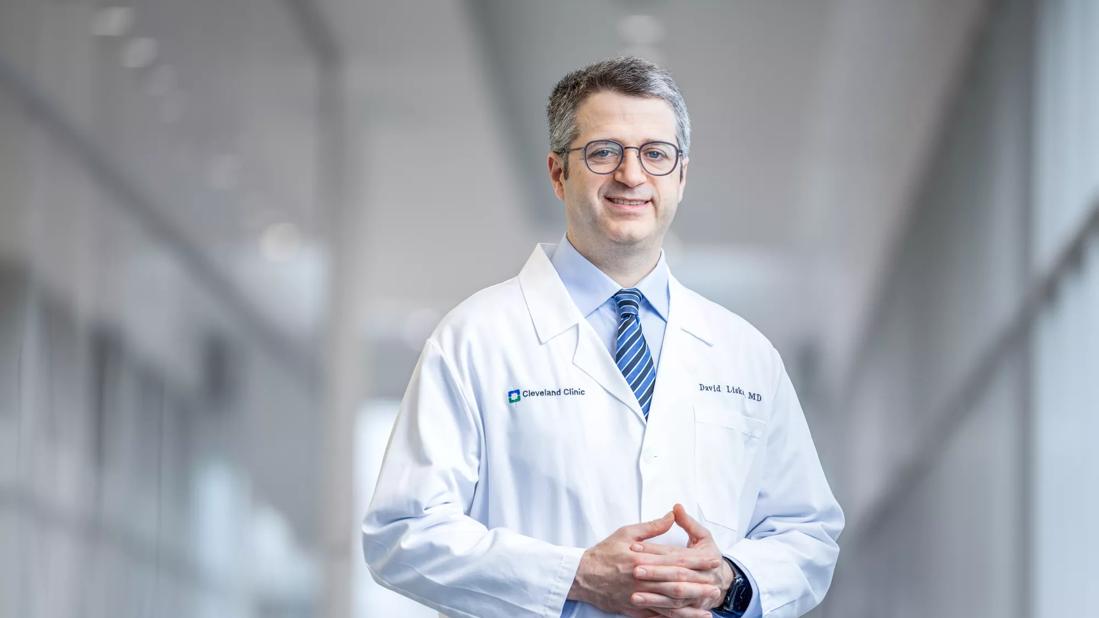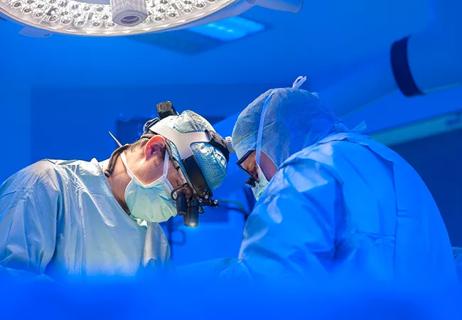The new appointee brings special expertise in hereditary and young-onset colorectal cancer

David Liska, MD, MA, has been appointed Chair of Colorectal Surgery at Cleveland Clinic. Dr. Liska completed his fellowship at Cleveland Clinic in 2014 and was subsequently appointed to the department as a colorectal surgeon. He replaces Scott Steele, MD, MBA, who held the position since 2016 before his appointment as President of the Cleveland Clinic Main Campus Submarket in 2023.
Advertisement
Cleveland Clinic is a non-profit academic medical center. Advertising on our site helps support our mission. We do not endorse non-Cleveland Clinic products or services. Policy
In addition to his role as Chair of Colorectal Surgery, Dr. Liska also serves as co-Director of the Comprehensive Colorectal Cancer Program and is the Director of the Sanford R. Weiss, MD Center for Hereditary Colorectal Neoplasia. In addition, he leads the Center for Young-Onset Colorectal Cancer and is the James Church and Edward DeBartolo, Jr. Family Endowed Chair. He specializes in hereditary and sporadic colorectal cancer, young-onset colorectal cancer and inflammatory bowel disease (IBD).
Dr. Liska attended Johns Hopkins University for his undergraduate studies and master’s degree. He received his medical degree from Yale University in 2006 and completed his residency in general surgery at NewYork-Presbyterian/Weill Cornell Medical Center in 2013. He completed a colorectal cancer research fellowship at Memorial Sloan Kettering Cancer Center in 2010 and his clinical fellowship in colorectal surgery at Cleveland Clinic in 2014.
Dr. Liska recently sat down with Consult QD to discuss his passions and vision for the Department of Colorectal Surgery.
A: I was always passionate about cancer research and surgery, but what drew me specifically to colorectal surgery was the influence of key mentors during my training, along with the fact that colorectal cancer is one of the most treatable types of cancer. This means that colorectal surgeons can often have transformative impacts on patients’ lives.
Another factor is that while a lot is already known about colorectal cancer from a molecular standpoint, there is still a lot of very exciting research going on, and things are constantly changing in our field. Even though we've been aware of colorectal cancer as a disease for hundreds of years now, the care for rectal cancer patients has changed dramatically over the last couple of decades and is still evolving today. The variety and complexity of surgical procedures performed by colorectal surgeons was another factor that attracted me to colorectal surgery, including the opportunity to invest in cutting-edge technology such as robotic and endoluminal surgery.
Advertisement
Lastly, the patient population for colorectal surgery is incredibly varied. It is a privilege to care for a broad spectrum of patients who are from different backgrounds and at different points in their lives. It is caring for patients that keeps me engaged and makes the work fun and interesting.
A: We have the largest and best colorectal surgery department in the world. We have over 20 colorectal surgeons here in Northeast Ohio, and we have large groups of experienced surgeons in Florida, London and Abu Dhabi. We are from many different backgrounds in terms of where our surgeons are from, where they trained and what area within colorectal surgery they subspecialize in. So as a group, we have very broad expertise in all things colorectal, but we also have many department members who are foremost world experts in rare conditions and cutting-edge complex colorectal procedures. I think what we as a group uniquely excel at is providing complex multidisciplinary care that’s collaborative, comprehensive, and compassionate to all of our patients. We have patients coming from all over the world to see our surgeons and multidisciplinary colleagues for that expertise.
A: We are constantly looking to grow and innovate in our tripartite mission revolving around patient care, research, and education. One of my priorities is to find opportunities for growth and synergy where we can focus on different colorectal disease processes and provide innovative and compassionate patient care. It's also important to look for ways to advance the field through impactful research and education.
Advertisement
Inflammatory bowel disease (IBD) has always been one of the areas where Cleveland Clinic is a recognized leader in delivering the best possible care to patients both from a surgical perspective and also from a medical one. With one of the largest experiences worldwide in J-pouch surgery, we are optimally positioned to continue advancing the field through research and improve the quality of life for patients with Ulcerative Colitis who need this type of surgery. Our multidisciplinary team is also actively studying how the combination of innovative surgical techniques and novel advanced medical therapies can improve outcomes for patients with Crohn’s disease.
I have recently been involved in an ambitious research initiative with Alok Kharana, MD, and Stephanie Schmidt, PhD, MPH to study early-onset colorectal cancer (EOCRC). We are working to better understand why we are seeing an alarming rise in the incidence rates of colorectal cancer in patients under 50 years old. We have made significant progress in comprehensively characterizing different aspects of EOCRC including genetic mutations, the microbiome and metabolome, and the immune tumor environment. One of our current research projects focuses on trying to determine which patients with Stage IV disease respond better to more aggressive treatments, including surgery to remove the primary tumor and the metastases, radiotherapy, and chemotherapy.
A: With the support of our multidisciplinary team of experts, I established the Cleveland Clinic Center for Young-Onset Colorectal Cancer in 2021. We are one of the few centers in the world providing individualized and comprehensive care specifically to this patient population. This has become an important focus in colorectal cancer as the number of patients under 50 diagnosed with colorectal cancer has gone up dramatically over the past few decades. Unfortunately, not only are we diagnosing more and more young people with colorectal cancer, but we’re also finding that many of these young people have a higher rate of advanced disease when they're diagnosed.
Advertisement
Our Center for Young-Onset Colorectal Cancer is comprised of a multidisciplinary group of clinicians and researchers. Besides providing daily care to young people with colorectal cancer, we also are actively meeting, discussing research projects and trying to figure out why this alarming trend is happening, as well as determining how we can better treat these patients to cure them and ensure the best quality of life after treatment. That’s something we as a group always have front and center in our minds. Our focus is not just on curing the disease, but also maximizing the quality of life for the patient after diagnosis and treatment.
A: Rectal cancer has undergone several paradigm shifts over the last 20 years in terms of how it is treated. One of the major shifts in this space within the last five years has been a focus on organ-preserving approaches, meaning curing the cancer without the need for major surgery. Our center participated in the seminal OPRA trial that was published a few years ago and has really changed how rectal cancer is treated globally. Since then, we've had scores of patients who in the past would've needed major surgery, and we’ve been successful in curing their cancer with a combination of chemotherapy and radiation followed by careful observation, thereby avoiding major surgery that usually requires an ostomy. That success is due, in large part, to our expertise and our collaborative multidisciplinary team, who are all partnering to achieve what's best for the patient and what's in the patient's interests. I think that mindset needs to be at the forefront of everything we do – recognizing what’s best for our patients and understanding how we as surgeons can help them achieve that.
Advertisement
Advertisement

Although the number of surgeon-scientists in colorectal surgery is small, a Cleveland Clinic colorectal surgeon-scientist shares his thoughts on what surgeon-scientists bring to the table

Results from a large cohort, retrospective analysis indicate that anastomotic leaks may not occur as frequently as previously reported

Benefits of neoadjuvant immunotherapy reflect emerging standard of care

Multidisciplinary framework ensures safe weight loss, prevents sarcopenia and enhances adherence

Study reveals key differences between antibiotics, but treatment decisions should still consider patient factors

Key points highlight the critical role of surveillance, as well as opportunities for further advancement in genetic counseling

Potentially cost-effective addition to standard GERD management in post-transplant patients

Findings could help clinicians make more informed decisions about medication recommendations